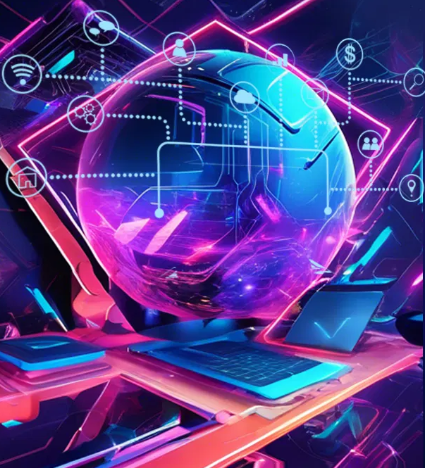10 AI Trends to Watch in 2024: Shaping the Future of Technology
- 373 Views
- admin
- 01/28/2025
- Artificial Intelligence
Artificial Intelligence (AI) is changing the way we interact with the world. From enhancing everyday tasks to revolutionizing entire industries, the latest AI developments are reshaping both our personal lives and business operations. Over the past few years, AI has grown rapidly, providing innovative solutions that are helping industries become more efficient, productive, and dynamic. Here, we take a look at the most exciting AI trends that are expected to shape the future in 2024 and beyond.
1. AI in Robotics: The New Frontier
Robotics is embracing AI to improve efficiency and unlock new possibilities. Companies like Olis Robotics are leading the way by developing autonomous systems with AI-powered software that can be used in various fields—from ocean exploration to hazardous chemical spill cleanups. These AI systems enhance robotic capabilities, allowing them to perform complex tasks with increased precision and reliability.
2. AI for Wildlife Conservation
AI is being used in unique and impactful ways to assist conservation efforts. Oxford University’s latest AI project, for example, uses machine learning to identify and track endangered species like chimpanzees in their natural habitats. By utilizing over 10 million images, researchers are improving conservation strategies while reducing the time and resources required for monitoring wildlife.
3. AI Advancements in Healthcare
The healthcare industry is experiencing a transformation thanks to AI. From diagnosing diseases more accurately to optimizing treatment plans, AI is enhancing the quality of care. The integration of AI in telemedicine, wearable devices, and patient management tools is helping healthcare professionals make real-time decisions. AI is also addressing challenges in diagnostic imaging, providing more accurate results with fewer resources.
4. Self-Driving Cars: Revolutionizing Transportation
The development of autonomous vehicles powered by AI continues to gain momentum. Predictions indicate that by 2030, autonomous vehicles could account for a large portion of the mileage driven in Europe. These vehicles are equipped with advanced sensors, real-time data processing, and connectivity that allow them to navigate safely and efficiently. AI is also set to play a crucial role in reducing carbon emissions by optimizing vehicle fuel consumption.
5. The Rise of Computer Vision and Video Analysis
Recent AI developments in computer vision are making video and image analysis more accessible and cost-effective. This technology is already making a significant impact in sectors such as manufacturing and healthcare. In healthcare, AI is improving the accuracy and speed of diagnostic procedures, while in manufacturing, it’s enhancing safety, quality control, and supply chain management.
6. AI Approaching High-Level Human Functions
AI is advancing beyond simple task automation to perform more complex functions. OpenAI’s multi-agent systems, for example, have demonstrated the ability to use tools and learn from observations without explicit instruction. This milestone is paving the way for AI to perform tasks that previously required human intelligence, potentially reducing the need for direct human intervention in certain areas.
7. Robotic Assistants: The Future of Caregiving
As the global population ages, the need for caregivers is becoming more urgent. AI-powered robots are being developed to assist with elderly care, including tasks like helping individuals get out of bed, managing medication schedules, and ensuring personal hygiene. Countries like Japan are already working to integrate robotic assistants into caregiving to address labor shortages and improve the quality of care for the elderly.
8. Enhancing Cybersecurity with AI
With the increasing volume of data being generated online, cybersecurity has become more critical than ever. AI is playing a pivotal role in defending against cyber threats by improving threat detection, responding to incidents faster, and identifying potential risks. Companies are leveraging AI-powered solutions like behavioral analytics and machine learning to secure sensitive data and networks.
9. AI in Financial Technology (Fintech)
The fintech industry has been rapidly transformed by AI, improving everything from fraud detection to transaction processing. Machine learning algorithms can quickly identify suspicious behavior and predict financial trends. Additionally, AI-driven chatbots are becoming a standard feature in banking apps, offering customers instant support and enhancing the overall user experience.
10. Smarter Smartphone Apps with AI
AI is becoming an integral part of smartphone apps, improving their functionality and user experience. Virtual assistants like Google Assistant and Siri are now widely used to manage tasks hands-free. Additionally, AI-powered apps like Microsoft Pix use machine learning to optimize photos, while new features in social media platforms, such as AI-generated filters and avatars, are transforming how we interact with technology.
What’s Next for AI?
The next few years will see AI continue to evolve, with advancements in machine learning, natural language processing, and autonomous systems. AI will not only improve existing technologies but also give rise to new industries and job opportunities. We can expect AI to become deeply integrated into various sectors, enhancing human capabilities and driving productivity.
One of the most exciting prospects for the future of AI is its role in scientific research. With AI’s ability to analyze vast amounts of data, researchers will be able to make faster breakthroughs in fields like biotechnology, climate science, and renewable energy. Additionally, as AI continues to enhance human decision-making and creativity, it will open up new opportunities for innovation and problem-solving.
Conclusion
Artificial Intelligence is undoubtedly one of the most transformative technologies of our time. From revolutionizing healthcare and transportation to enhancing cybersecurity and fintech, AI is becoming an essential part of every industry. The future looks bright as AI continues to evolve and integrate more deeply into our personal and professional lives. As we move forward, it will be crucial to continue exploring the potential of AI while addressing the ethical and social challenges it presents.
Recent Posts
- How AI is Revolutionizing Architectural Design: A Look at Tools, Trends, and the Future
- Streamlining Cyber Risk Assessments Through Automation
- Understanding the Difference Between Blockchain and Distributed Ledger Technology
- Is Bitcoin Mining Still a Viable Venture in 2025?
- Exploring AI: Unveiling Possibilities, Challenges, and Future Implications

